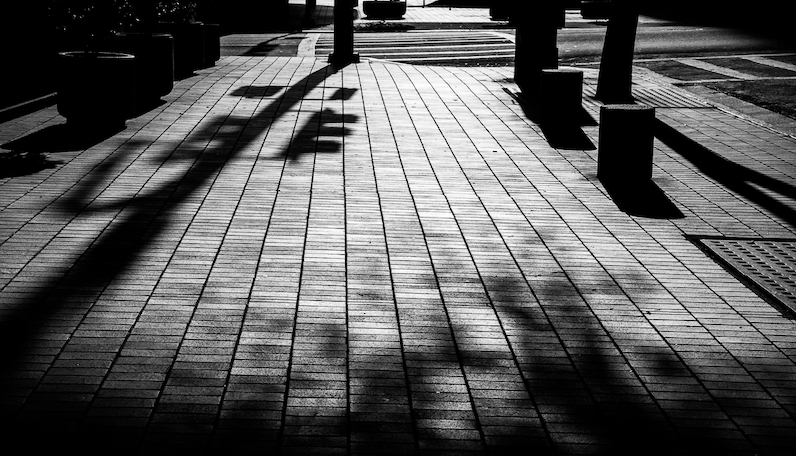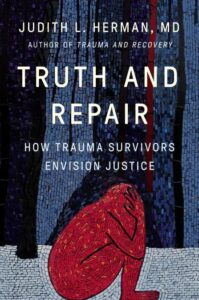
What Survivors of Trauma Demand From Their Abusers—and the Public At Large
Judith L. Herman on Collective Acknowledgement in the Aftermath of Sexual Violence
“Survivors tell us what they want. We should listen.”
–Alexandra Brodsky, Sexual Justice
*Article continues after advertisement
The first precept of survivors’ justice is the desire for community acknowledgment that a wrong has been done. This makes intuitive sense. If secrecy and denial are the tyrant’s first line of defense, then public truth telling must be the first act of a survivor’s resistance, and recognizing the survivor’s claim to justice must be the moral community’s first act of solidarity.
The First Speakout on Rape, organized by New York Radical Feminists, took place in 1971. There, the public testimony of survivors created a new kind of open courtroom, one in which violence against women would no longer be considered a private misfortune but rather viewed as a criminal injustice that had long been invisible and tacitly condoned. In declaring their stories with righteous outrage rather than shame, survivors collectively challenged the wider community to recognize truths long hidden.
Fifty years later, when survivors organize, this remains their first demand. In 2020, Nikita Mitchell from Me Too International welcomed some twelve thousand survivors to an online meeting with these words: “Survivors across the country, across the globe have stepped into naming that ‘I, too, have experienced sexual violence,’ and ‘I, too, deserve justice,’ ‘I, too, deserve to live in full dignity and humanity.’”
In this and the following chapters, we will hear the voices of the survivors who so generously shared their testimony with me. In our interviews, I asked them to imagine what justice might look like if they had complete freedom to determine what should be done. What would they wish for from the wider community? What would they wish for from offenders? Not surprisingly, the responses were quite varied, and yet, common themes emerged in their visions of justice: the need first of all for full acknowledgment and then for repair of the harm through apology and accountability. These are the themes that Part Two will elaborate.
Recognizing the survivor’s claim to justice must be the moral community’s first act of solidarity.
The survivors whom I interviewed about their dreams of justice were in unanimous agreement on this first point: They wanted the truth to be known. One survivor of many years of domestic violence (identified only by her initials, ER) said simply, “I just want people to know who he is, what he did to me. This is what he did to another human being!” She also wanted him to face what he had done. “He would say that it’s a lie, and he would believe it. He won’t let himself know what he did. Sit down! You have to hear what you did!”
Many other survivors also felt it necessary to insist first and foremost on simple recognition of their humanity. Kate Price, a scholar in women’s studies who is a survivor of incest and sex trafficking as a child, described what she thought should happen to the men who paid to use her body: “The sex buyers were truckers. They felt it was a woman’s job to serve them. I want nothing to do with them. I would never want to see them—they make my skin crawl.
But I would want them to hear my words: ‘I’m a living, breathing human being. I’m not just a body.’” She, too, wanted her abusers to have to sit down and listen, and she wanted them to acknowledge publicly what they had done. “I would want them to hear from all the other children they’ve hurt. I would want their families to know, too. Maybe the men would be required to write a letter to their families and tell the truth.” Daylight, in her mind, was the first step toward justice.
Many survivors sought acknowledgment of the truth not only from the perpetrators but also from the bystanders who were actively or passively complicit, and sometimes this kind of acknowledgment felt as important as the perpetrator’s confession, or even more important. Dr. Price, for example, wanted the truth about sex trafficking of children and adolescents to be known in the wider community in the rust belt of Pennsylvania, where she had grown up. “Our culture fuels this,” she said. “We breed this. In Appalachian culture you’re supposed to be poor and know your place and like it. There’s a pattern of exploitation.”
She didn’t see the point of punishing the men who paid to use her body (though she did want her father, who sold her, to be punished), even though they must have known she was underage and drugged into passivity. “Even if we locked up every purchaser tomorrow there’d be another generation,” she said. “So we need acknowledgment on a massive scale. We need the authority of the state creating a tribunal where victims’ testimony was important.”
Acknowledgment on a massive scale means recognition not only of the crimes committed by individual perpetrators but also of the complicity of all the people who enabled them. For instance, in 2003, soon after the Boston Globe’s Spotlight investigation first revealed numerous instances of child sexual abuse within the Catholic Church, a group of survivors came together to write a detailed manifesto titled “A Call to Reform the Archdiocese of Boston.”
Their very first request was for the church hierarchy to “admit to their culpability and guilt in knowingly moving pedophile priests from parish to parish, resulting in the additional abuse of countless children.” They requested further that this acknowledgment be given publicly and in writing, and they wanted the church to stipulate “that the abuse was not the fault of the victims, and that the shame belongs only to those who did the abuse and those who covered it up.” Like my informants, these survivors, too, wanted all those implicated to admit how deeply these abuses of power were embedded in their traditional institutions. (We will learn more about what happened to this call to reform in Chapter 6.)
Beyond the acknowledgment of bare facts, survivors also wished for acknowledgment of harm.
Beyond the acknowledgment of bare facts, survivors also wished for acknowledgment of harm. Though denial of the facts tends to be the perpetrator’s first line of defense, when confronted with evidence, some will acknowledge the facts while dismissing or minimizing their importance. This is the “no big deal” defense: Why is she making such a fuss? Why is she being such a prude? She has no sense of humor. It’s really just a misunderstanding. Besides, it’s over. Why is she still bringing this up now? It’s time for everyone to move on. Some perpetrators seem perfectly willing to admit what they have done but are either unaware or unconcerned that their victims were hurt and blame the victims for complaining.
“Rose,” now a professor of criminal justice, tells of having been raped years ago, when she was a college student. She had been drinking at a party and must have passed out, because initially she had no memory of the incident. Word got around, and she first learned what had happened from a former boyfriend, who was upset with her for having “slept with” the boy who raped her. “I didn’t even name this as rape for years,” she admitted, with some bewilderment. The perpetrator was someone she knew from high school. “I didn’t think he was a horrible person,” she said. So she called him up to confront him. To her amazement, he didn’t deny it. Instead, he was strangely matter-of-fact, saying, “Oh yeah, you were really out of it.” “Not apologetic at all,” she reported.
The offender was not alone in his lack of sympathy for her. The day after the rape, she went for medical attention because she was in pain and was found to have a bladder infection. “Must have been a rough night,” the doctor said, with a smirk. “Like, ‘this is what you get,’” Rose remarked.
Survivors do not want their injuries to be trivialized or ridiculed, and they do not want to be blamed for them. They do not want to be dismissed as overly emotional or told to “get over it.” They want their communities to recognize and respect their suffering and to acknowledge the seriousness of the harm they have endured. As individuals they want the people who form their moral communities to hear them, to believe them, to recognize that they have been hurt, and to offer help and support. As a group, they want the larger public to recognize that survivors are everywhere and that sexual violence is a major public health problem, not simply a private misfortune.
__________________________________

Excerpted from Truth and Repair: How Trauma Survivors Envision Justice by Judith L. Herman, MD. Copyright © 2023. Available from Basic Books, an imprint of Hachette Book Group, Inc.
Judith L. Herman
Judith L. Herman, MD, is a professor of psychiatry at Harvard Medical School. She was the recipient of the Lifetime Achievement Award from the International Society for Traumatic Stress Studies and is a distinguished life fellow of the American Psychiatric Association.



















